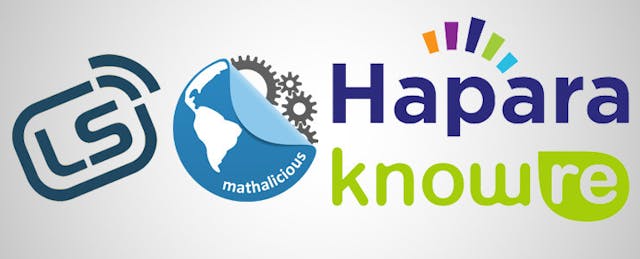A day after the New York City Department of Education announced the winners of its ‘Gap App’ educational software challenge, the DOE hosted a demo night where the public could meet the nine finalist companies.
Around 125 teachers, developers and entrepreneurs gathered at General Assembly, a co-working space in Manhattan. In contrast to Tuesday’s press conference, the demo night had the informal feel of a Meetup. After the Gap App honorees (four winners and five honorable mention finalists) were introduced, attendees were free to try out the apps at hands-on demo stations (equipped with computer monitors, laptops and iPads) or simply chat and mingle.
The event was the latest NYC DOE effort to foster dialogue and promote cooperation between administrators, teachers, entrepreneurs and developers. The New York City school system can feel like a walled-off kingdom, even to those in the edtech community. Vendors that sell products and services to the country’s largest school district sometimes have to wait 14 months just to receive payment.
InnovateNYC was established to eliminate or at least minimize these obstacles. The federally-funded initiative is part of the NYC DOE’s iZone schools program and has a mandate to revamp the way the DOE procures software. Under InnovateNYC’s guidance, the DOE has started to tweak some long-established business models. Schools often treat developers as adversaries, but the relationship should be more symbiotic, says Steven Hodas, InnovateNYC’s executive director. “It’s been too hard for small companies to come work with us,” said Hodas at the demo night. “We’re trying to fix that…we want developers to give us their best work.”
The Gap App Challenge is the DOE’s first big step towards establishing a more collaborative edtech ecosystem. To further build community, InnovateNYC has begun hosting edtech panel discussions, "fireside chats" with DOE staffers, and developer field trips to New York City schools. Its next major event will be a music education apps hackathon on June 28th and 29th, in partnership with the music streaming service Spotify. Hodas said future apps competitions could focus on other aspects of academic life such as parents’ issues, the school selection process or data visualization.
Developers at the demo night said they welcomed the opportunity to forge connections with New York City schools. Sean Berry, the founder of Algebra Touch, a Gap App finalist, has been selling his algebra app since 2010. Berry regularly updates the app based on user comments, but admits he still craves teacher feedback. “As a full-time developer, I don’t have a bunch of teacher colleagues,” he told EdSurge. “Hopefully I’m making contacts here…I’m finding it valuable just to be part of the teacher scene.”
Other Gap App finalists said the Challenge motivated them and shaped their apps in key ways. The Woot Math team was already developing a tablet-based math app when the Challenge was announced in January. After the Boulder, Colorado company learned about the competition, it sped up production to meet the Challenge’s April deadline. “It was very encouraging, because it showed there was clearly a need for this kind of app,” Woot Math VP Tom Fischaber told EdSurge.
Fischaber is something of a serial edtech entrepreneur, having sold his previous company, Kerpoof, to Disney in 2008. But he said most of his school contacts are local, and hopes the Gap App Challenge will win Woot Math broader support when it launches this fall. “We’re actively working on pilot tests with a couple Boulder and Denver schools, but getting plugged into the New York community is great, too,” said Fischaber.
Derek Lomas, one of the founders of Fraction Planet, another Gap App finalist, said the Challenge helped his team quickly refine its app. “We had made all these games, but were struggling to think of a way to make them easy for teachers to use,” Lomas told EdSurge. After Lomas’ colleagues heard about the Gap App Challenge, they wove their games into a complete fractions curriculum for fourth to eighth graders. The app “became straightforward; something students just play,” said Lomas.
Fraction Planet is currently in private beta for Pittsburgh teachers and students but will open up to New York teachers in the next few weeks. Lomas, who is a Ph.D. student at Carnegie Mellon, is planning to charge money for the tablet version of the app but keep the web version free. “It’s so hard to sell to schools,” he said. “We think we can maximize usage in the classroom by keeping our app as free as possible.”
To make the Gap App Challenge a success, the DOE will need to help developers like Lomas get into schools and make money. InnovateNYC’s Hodas anticipates Gap App programmers will pair up with New York schools as “developers in residence,” but acknowledges that educators will ultimately decide whether to invite the companies into their classrooms.
Teachers seem interested as long as the software meets their school’s particular needs. William Frackelton, the principal of Bronx’s Soundview Academy, an iZone school, said he expects his teachers to try out several Gap Apps, including KnowRe, Fluid Math and LiveSchool. The apps should be a good fit for Soundview’s integrated co-teaching (ICT) classes, which mix general learners with special education students, said Frackelton.
Mike Viau, who teaches Soundview’s seventh grade ICT class, said Gap Apps’ main advantage over other edtech apps is developer accessibility. Viau said he may ask Gap App developers to modify their apps to allow students to compete against each other. Viau may also want to fine-tune the student diagnostic data teachers can see.
These are just a few examples where customizing Gap Apps will require close developer-educator communication. The results will show just how strong this budding ecosystem really is.


